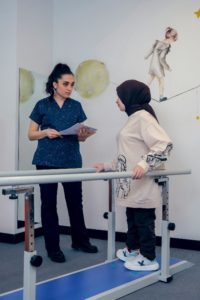Amanda Greenhalgh
Principal Occupational Therapist

How can AHPs support during the cost of living crisis?

Over the past few years, many of us will have noticed the cost of daily living has increased rapidly. Food prices, energy bills and housing costs have all become more expensive, leading to an increased number of people experiencing fuel poverty and food insecurity.
Fuel poverty is a major issue in the UK, with 13% of households unable to afford to keep their home adequately heated. Cold, damp homes are linked to a number of health problems including respiratory conditions and poor mental health, and those with existing disabilities or health conditions are especially vulnerable.
Food insecurity has also increased across the UK due to the rising cost of basic food items. Food insecurity is a term used for when individuals don’t have access to enough food, or adequately nutritious food, to meet their basic needs.
Those with a disability or long-term physical or mental health condition are disproportionately affected by food insecurity. In June 2024 nearly a third of households with an adult limited a lot by disability experienced food insecurity, and individuals with a mental health condition are over twice as likely to experience food insecurity than those without.
The cost of living crisis negatively impacting people’s living conditions, diet and mental health can mean that they need to access health services more often. Together with increased expenditure on fuel, energy and goods necessary to provide healthcare, this can put an extra strain on the NHS and means that providers have to work hard to cut costs without impacting patient care.
Allied Health Professionals (AHPs) are ideally placed to support people through the cost of living crisis. AHPs often work in the community and can pick up on early warning signs that someone may be struggling, and can ensure they are signposted to the appropriate services to obtain help.
The cost of a typical weekly food shop has increased by over 27% since 2022
Rising food prices alongside financial pressure from housing and energy and housing bills has made it increasingly difficult for people to eat a healthy, balanced diet. The cost of a typical weekly food shop has increased by over 27% since 2022, and this rise in price is felt even more severely by those already on a tight budget.
Dietitians have the knowledge and the skills to help individuals reduce food bills whilst eating a healthy, balanced diet. For example, dietitians may provide advice on :

Special diets for specific health conditions or allergies can be expensive and limiting, for example a strict gluten free diet can be up to 35% more expensive than a regular diet. Working with a dietitian can help patients to reduce food bills through education about food labelling and allergen-free alternatives, and signposting to charitable organisations and support groups.
Poor nutrition is a huge contributor to long term poor health, which comes at a cost to both patients and the NHS. By helping people eat a healthy balanced diet, dietitians can help reduce the cost to individuals and the NHS further down the line.
Occupational therapists (OTs) help people to maintain independence and take part in the activities that are meaningful to them in everyday life.
Poor mental health and financial troubles can be closely linked. Worrying about money can exacerbate feelings of anxiety and depression, and poor mental health can make managing a budget much more difficult, leading to a vicious cycle.
OTs working in mental health can help individuals develop skills around:

Modifications to homes to improve accessibility after injury or illness can be expensive. OTs can help by suggesting low-cost modifications to homes and workplaces to improve accessibility, creatively repurposing objects that may already be in the home to use as mobility aids or supports.
Promoting independence at home can save money for both patients and the NHS, reducing reliance on costly care packages and incidence of accidents or falls that result in long hospital stays.
Musculoskeletal (MSK) injuries are injuries to a person’s bones, muscles, joints and connective tissues. These can be acute injuries such as fractures and sprains, or long-term conditions that cause inflammation, stiffness and chronic pain. Musculoskeletal injuries are one of the most common reasons for sickness absence from work in the UK, with chronic joint pain and osteoarthritis affecting over 8.75 million people.
Pain and loss of mobility can make it more difficult to work, which can have a significant impact on finances alongside negatively impacting mental health and wellbeing.

Physiotherapists work with patients to restore and improve movement and function after illness or injury, assessing and diagnosing issues and providing advice on how to manage MSK pain and regain strength and mobility in affected areas. Providing physiotherapy in community settings such as gyms and leisure centres makes it easier for communities to access services, and reduces the burden of travel to hospital for patients.
Physiotherapists have a key role to play in preventing illness and injury through supporting individual and community access to physical activity, building healthier and more resilient communities in the long-term.
Financial worries often cause stress, anxiety and depression. AHPs such as Art, Drama and Music Therapists can help individuals to reduce stress and work on the resilience and emotional skills required to deal with difficult situations.
Creative activities such as art, dance and music can be carried out as individual or group sessions in schools, care homes and rehab centres and can help to foster a much-needed sense of community when times are tough.
Research has shown that using creative therapies for patients with neurodegenerative conditions such as Parkinson’s Disease can help improve emotional wellbeing and life satisfaction, and even reduce frequency of visits to other healthcare staff, leading to less financial burden for both patients and the NHS.

Allied Health Professionals are not immune to the impact of the cost of living crisis. Many professional bodies for AHPs provide support to their members to help them to secure fair pay and conditions at work, support through any legal action, and promote and provide funding opportunities for research.
Funding is also available for those who wish to complete further study or training to become an AHP, providing support with Further and Higher education, and help with costs of accommodation and travel during clinical placements.
If you are aged 16-19, you do not usually need to pay to study for a level 3 qualification in the UK, and if you are over 24 studying for your first level 2 or 3 qualification you may not need to pay.
You may be eligible for help with costs associated with studying, such as transport, books and equipment.
For mature students, there are loans and grants available to allow you to study a level 3 qualification.
The NHS Learning Support Fund offers training grants and help toward the cost of clinical placements for eligible students whilst studying on many Allied Health Profession courses.
Support includes:
Student loans are available to help cover University course fees and living costs. If you are studying medicine or an allied subject, you may still be eligible to receive student finance even if you have already studied at university or previously received student finance.
Disabled Students’ Allowance is available for students who have a health condition that affects their ability to study, such as a physical disability, mental health condition or long-term health condition.
Many universities offer bursaries and scholarships for students entering Higher Education from disadvantaged backgrounds, or who would otherwise be less likely to pursue degree-level study. This includes bursaries for carers of dependent adults, those who are the first in their family to attend university, and individuals from under-represented ethnic minority backgrounds.
Find out more about the different AHPs and the routes people have taken.